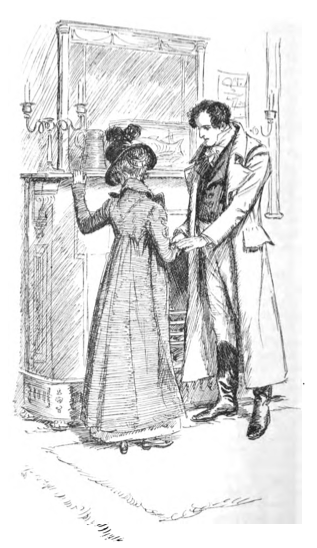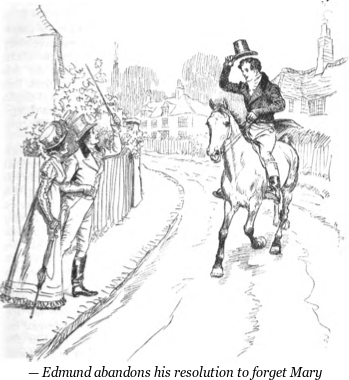This is sixth in a series of guest posts written by “Sophie” of A Reasonable Quantity of Butter in celebration of Mansfield Park’s bicentennial.
***
In many novels, much of the drama revolves around a concealment. These passages are especially irksome because great harm often comes from the concealment, and it would be so simple for the informed character to say something and avert the catastrophe.
Often these concealments arise from some romantic fancy. In Far From the Madding Crowd, Gabriel Oak conceals Sergeant Troy’s former relationship from Bathsheba out of a mistaken sense of obligation to Fanny Robin. In Bleak House, Lady Dedlock conceals her past from her husband, even though speaking out would completely disarm her enemy, because she fears losing her husband’s esteem. Other characters feel that it would be wrong to speak ill of someone, even when not speaking injures another person—a person who really has a right to know.
Whereas I have come to expect misguided concealments in novels such as those by Dickens and Hardy, I was surprised to meet one in Mansfield Park.1 Happily, it has no effect on the outcome of the story, but it is still there!
Fanny Price keeps important information from Edmund. As Edmund’s only confidant, she knows that, although he is deeply in love with Mary Crawford, several things would keep him from proposing to her: Mary’s love of money, love of prestige, and contempt for Edmund’s profession. In fact, these did at one point decide Edmund against marrying her. After his ordination, he purposely stayed away from Mansfield to avoid seeing Mary, intending to return only after she left.
Fanny is uncertain as to how much Mary’s fondness for Edmund may have overcome her worldly notions, and she must, in any case, leave Edmund to his own judgment. What good would it do to convey doubts and suspicions to a mind accustomed to excusing them? And what right had she to do so—would it not be only indulging her own envy?
But while in Portsmouth, Fanny receives confirmation of her fears in writing from Mary.2 There, in Mary’s own handwriting, is evidence that she loves money and position in society to the point of wishing Edmund’s brother dead, and looks forward to Edmund’s profession being concealed as a past disgrace!
Despite any attending awkwardness, I think Fanny should have forwarded Mary’s letter to Edmund. He had a right to know.
***
1There is a misguided concealment in Emma, which is crucial to the plot, but Austen handles it much differently than the other authors mentioned. Also, in Pride and Prejudice, Jane and Elizabeth choose not to publish Wickham’s true character because he is leaving soon.
2“Poor young man! If he is to die, there will be two poor young men less in the world; and with a fearless face and bold voice would I say to any one, that wealth and consequence could fall into no hands more deserving of them. It was a foolish precipitation last Christmas [Edmund’s ordination], but the evil of a few days may be blotted out in part. Varnish and gilding hide many stains. It will be but the loss of the Esquire after his name. With real affection, Fanny, like mine, more might be overlooked.”—Mansfield Park, Chapter XLV






